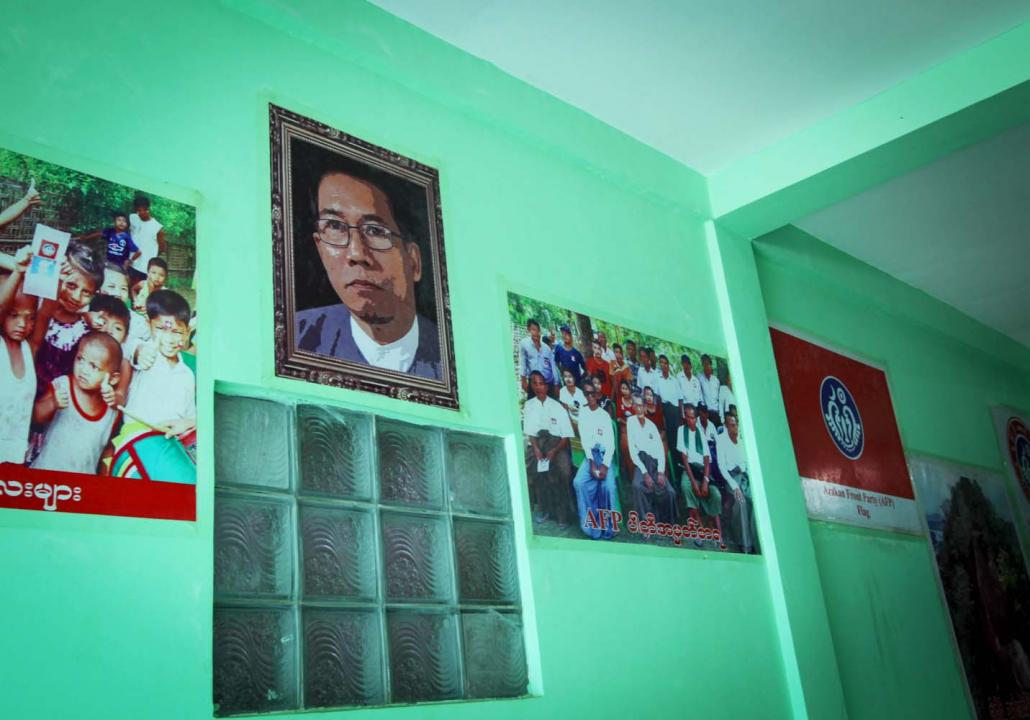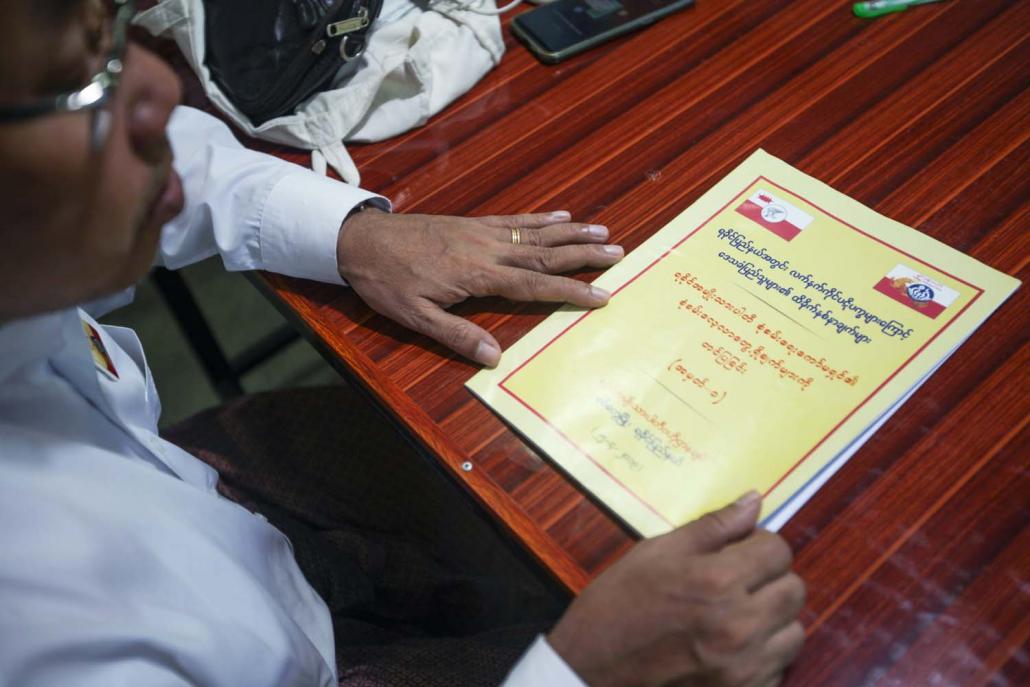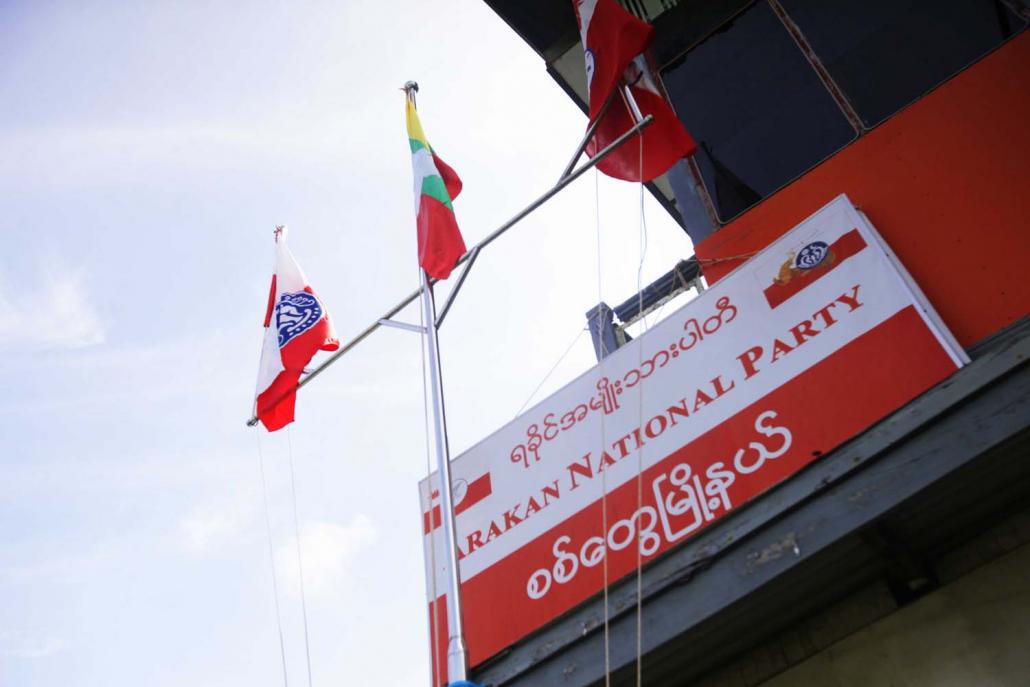Fighting between the Arakan Army and the Tatmadaw and a fractious political environment are contributing to uncertainty and apprehension in Rakhine State over the election due next year.
Words & photos by KYAW LIN HTOON | FRONTIER
THE FRONT door to the Arakan National Party headquarters in Sittwe is open, but when I wander inside there’s no one at the reception counter. The lights are switched off but through the darkness I can see everything is covered in a layer of dust.
Standing in front of me is the party chair, U Thar Tun Hla. He’s shirtless and his longyi is rolled up tightly like a loincloth, in the manner of a chinlon player on the street. He’s doing some martial arts-like stretches in the early evening gloom.
Two assistants stand nearby, watching. They are the only people in the office.
When I ask for an interview, he says he is tired from travelling to deliver supplies to displaced people in conflict areas. He asks me to come back in the morning and I walk out the door, leaving him to his exercise.
Support more independent journalism like this. Sign up to be a Frontier member.
The visit to the silent, almost abandoned ANP headquarters is a stark contrast to my memories of the 2015 general election, when the party office had been vibrant and alive with activity. The mood then was optimistic, expectant – and then jubilant, as the ANP went on to win almost half of all seats in the Rakhine State Hluttaw.
Times have changed, though. Few parts of Myanmar have undergone such a dramatic – and tragic – shift over the past four years as Rakhine: a bloody insurgency, accusations of genocide, the imprisonment of the state’s leading political personality and a split in the state’s major party.
These events have shaken the state’s political dynamics and cast a shadow over the general election scheduled for next year. As in 2015, hundreds of thousands of Rohingya Muslims in the state will ineligible to vote because they are denied citizenship; but some question whether the vote will even take place, at least in some parts of the state, because of widespread conflict.
During a recent visit to Sittwe and other parts of Rakhine State, it was clear that the election was far from the minds of most people, who instead seemed preoccupied with the conflict between the Arakan Army and Tatmadaw, in terms of both the human and economic impacts.
U Zaw Zaw Htun, the secretary and co-founder of the Rakhine Ethnics Congress, a civil society group, said many people in Rakhine State had lost faith in party politics since 2015.
He said many were disappointed after ethnic Rakhine parties won the largest number of state hluttaw seats in both the 2010 and 2015 elections, but had been unable to form a government in the state. Under the 2008 constitution, the Myanmar president, rather than the state hluttaw, selects the chief minister.
The arrest of former ANP leader Dr Aye Maung in early 2018 and his imprisonment for 20 years on a high treason charge had driven many people to shift their support to the Arakan Army.
“At the time when trust in politics was already fading, the conflict started so people’s attention shifted to armed revolution. Among young people, support for the AA is high,” Zaw Zaw Htun said.
The results of a International Republican Institute survey conducted nationally in June and July reflect the growing discontent in Rakhine, which had the equal-lowest proportion of respondents who said the country was heading in the right direction (65 percent) and the highest who said the country’s economic situation was “very bad” (26pc).
Respondents from Rakhine were also among the most likely to support more autonomy for states and regions and more control for states and regions over natural resources, and the most likely to prefer a chief minister elected by their state rather than appointed from Nay Pyi Taw. Rakhine was also the only state or region to list “ethnic conflict” among the top three problems from a list of 16.
With the next general election – the third since the transition began to a “disciplined democracy” – expected around a year from now, political analysts are beginning to consider what impact these developments might have on the vote.
img_0718.jpg

A portrait of Rakhine political figure Dr Aye Maung, who is serving a 20-year prison term for high treason, hangs in the Arakan Front Party office in Sittwe. (Kyaw Lin Htoon | Frontier)
The countdown
But will the election be held at all? Fierce fighting between the Tatmadaw and Arakan Army has many wondering whether the Union Election Commission might cancel voting in some areas or even entire constituencies, particularly in central and northern Rakhine.
Thar Tun Hla, the ANP chair, said the uncertainty about whether people will able to exercise their right to vote was dampening interest in the election.
“It’s really hard to say what the election will look like – whether it will take place everywhere, just in some places or be cancelled completely,” Thar Tun Hla told Frontier. “The Union Election Commission is yet to give an unequivocal pledge that there will be an election in Rakhine.”
However, UEC spokesperson U Myint Naing insisted that it was making arrangements for voting to take place in Rakhine next year.
“We have already arranged to hold the election in all constituencies in Rakhine,” he said, while declining to say how the UEC might respond if conflict continued in some parts of the state. “I don’t want to respond to the criticism of the UEC … I only want to say that we have already made arrangements.”
However, even a partial cancellation within constituencies, applying only to particular village tracts and not others and allowing the relevant parliamentary seats to still be filled, could alter the outcome of the vote, several ANP officials said.
“We are worried that the election will be cancelled in areas where our support is strongest,” said U Oo Tun Hlaing, the ANP party chair for Mrauk-U Township, which has seen heavy conflict since early this year.
He said that if the cancellation is based on where there is active conflict, then it should not have a significant effect on the election because fighting is mostly in remote areas where there are relatively few voters.
“For example, it should be possible to hold the election in at least 75 percent of Mrauk-U, but few people live in the remaining 25pc. It’s similar in Kyauktaw, Ponnagyun and other townships.”
Meanwhile, civil society organisations in Rakhine and elsewhere are focused on ensuring that the preparations for an election in the state are as smooth as possible.
Some CSOs have expressed hope that the Tatmadaw and the AA could agree to a ceasefire for a few months ahead of election day, which would help to ensure there was a high turnout.
Daw Mya Nandar Thin, an executive director of Yangon-based New Myanmar Foundation, a CSO that promotes civic and voter education, said it was essential that all stakeholders in Rakhine get together to discuss strategies aimed at ensuring that the election is a success.
Mya Nandar Thin, who has a decade of experience in election-related advocacy and election monitoring, said it was critically important that no person or group made any statement that could provide justification for cancelling voting in Rakhine.
“Of course, there are many people and groups that have diverse ideas and thoughts, but they have a responsibility to ensure that the election process is successful because it is vital to keep our democracy alive,” she told Frontier.
Despite the uncertainty and perceptions of low public interest, it seems many people still plan to vote if the election goes ahead in their constituency. Just 6 percent of the respondents in Rakhine to the IRI survey said they were unlikely to vote, or refused to answer – among the lowest proportion among all states and regions.
img_0772.jpg

U Thar Tun Hla, chair of the Arakan National Party, holds a report the party compiled about human rights violations in Rakhine State. (Kyaw Lin Htoon | Frontier)
Bucking the trend
Unlike in other states, where the trend has been towards the consolidation of parties representing a particular ethnic group, Rakhine State has seen ethnic Rakhine political forces splinter into new entities. This has introduced a new degree of uncertainty into the political landscape, and makes election results hard to predict.
Rakhine has 11 state-based parties, of which four represent the aspirations of the ethnic Rakhine majority and seven stand for minority groups in the state, such as the Mro, Khami and Daingnet.
Ethnic Rakhine parties have performed strongly since 1990, when the Arakan League for Democracy won 11 seats, making it the third-largest party nationally. The ALD boycotted the 2010 vote, but the Rakhine Nationalities Development Party led by Aye Maung won 18 seats in the state hluttaw, as well as 16 in the national legislatures. After the U Thein Sein government began political reforms, the Arakan League for Democracy re-registered and merged with the RNDP to form the ANP.
The ANP was the dominant party in 2015, winning 22 of the 35 elected seats in the 47-member state hluttaw, trouncing both the National League for Democracy, which won nine seats, and the Union Solidarity and Development Party. The ANP also won 22 seats in the national legislature.
But not long after the election, cracks began to emerge. ALD figurehead U Aye Thar Aung accepted the post of deputy speaker of the Amyotha Hluttaw, apparently in contravention of an ANP policy to not cooperate with the NLD unless it agreed to appoint a member of the party as chief minister of Rakhine. The infighting continued over the next 18 months, until Aye Maung resigned from the party in November 2017.
But there was more drama to come. The following January, Aye Maung was arrested after giving a public speech in Rathedaung Township in which he was alleged to have said that the Bamar-dominated National League for Democracy treated the Rakhine people “like slaves”.
He was speaking at an event held to mark the anniversary of the fall of the Arakan kingdom to the Bamar Konbaung dynasty in 1784. In an indication of the emotion that the defeat excites among the Rakhine, a gathering to mark the anniversary a few days later at Mrauk-U, capital of the Arakan kingdom, turned violent and nine people died after the police opened fire on the crowd.
In March, Aye Maung was convicted and sentenced to 20 years’ imprisonment for high treason and defaming the state. A co-speaker at the Rathedaung event, Rakhine author Ko Wai Hin Aung, was charged with the same offences and also received a 20-year prison sentence.
They were also accused of expressing support for the Arakan Army at the Rathedaung event but charges against them of breaching the Unlawful Associations Act were dropped.
Aye Maung is awaiting the result of a special appeal against his conviction.
Many Rakhine politicians told Frontier that the political climate in the state had been soured by his arrest and sentencing.
But Aye Maung’s imprisonment does not appear to have diminished his political influence. While still on trial, he applied to establish the Arakan Front Party, and the new political vehicle was formally registered with the UEC in January.
In the meantime, his son, U Tin Maung Win, had competed in the November 2018 by-elections for a state hluttaw seat as an independent, and easily defeated the ANP candidate with around 80 percent of the vote. Tin Maung Win has since joined the AFP as a central executive committee member.
U Aung Than Wai, another founding member of AFP, said Aye Maung had played a dominant role in Rakhine politics.
“He is a prominent political leader among the Rakhine people, but since he has been arrested and sent to jail for 20 years only for making a speech, the people’s confidence in party politics has faded,” Aung Than Wai told Frontier.
“A consequence of this is that support for the armed revolution has grown,” he said, referring to the Arakan Army, which claims to be fighting to realise the Rakhine people’s dream of self-determination.
img_0758.jpg

Kyaw Lin Htoon | Frontier
After the split
The likelihood that the ANP and AFP will split the ethnic Rakhine vote under Myanmar’s first-past-the-post system, coupled with the potential that some ethnic Rakhine might abstain from voting, should potentially increase the chances of victory for national parties like the NLD and USDP.
The NLD is expected to once again perform strongly in southern Rakhine State, but few people Frontier interviewed believed either the NLD or USDP could win seats in central and northern Rakhine – provided voting goes ahead in most areas.
The Tatmadaw’s bloody campaign in Rakhine State against the AA, which has seen 65,000 people displaced and scores of civilians killed, has heightened public anger towards the central government and the ethnic Bamar.
Many Rakhine also remain furious that after the 2015 election the NLD nominated one of its own MPs, U Nyi Pu, as chief minister – despite the ANP winning more than twice as many seats in the state hluttaw – and then charged Aye Maung with high treason.
“The number of voters will go down and then there will be vote splitting, but the Rakhine parties will still be ahead of the NLD or USDP. I’m fairly confident about that,” said Zaw Zaw Htun from the Rakhine Ethnics Congress.
In most seats, then, the contest is likely to be between the ANP and the AFP. It will be a battle of party machine against personality.
The ANP has all the infrastructure of a serious political party, including offices, experienced candidates, and a seemingly large pool of members and volunteers.
Party chair Thar Tun Hla suggested that voters would also punish the AFP for breaking away. “I’m sure that the Rakhine people don’t like the way that some politicians are leaving a dominant party that the people rely on and then organising new parties,” he said.
Thar Tun Hla said he had confidence in the Rakhine people to make an informed choice when they vote. “They know exactly which party to choose, and I am quite confident that the ANP will win the 2020 election with a similar result as we achieved in 2015,” he said.
The AFP, meanwhile, is still in its infancy. It has relatively few members and just a handful of offices. It hasn’t even selected a chair, vice chair or general secretary from among its CEC.
But what it does have in its corner is the state’s most recogniseable political figure, Aye Maung. And if modern Myanmar political history is any guide, personality is going to count for a lot when people go to vote next year.
Tin Maung Win’s 2018 victory in Rathedaung-2 underscores the potential for Aye Maung to influence the outcome. His overwhelming victory was based largely on his father’s endorsement, in a vote that also saw an unusually high turnout for a by-election.
In a rare interview at the party’s office in Sittwe, Tin Maung Win expressed confidence that the AFP would perform strongly next year based on Aye Maung’s endorsement.
“We have complete trust in the political awareness of our supporters; they know exactly which party to vote for,” said Tin Maung Win. “Everybody knows that AFP is the party of Aye Maung.”







